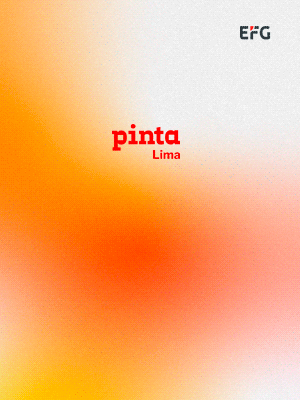LAMAS AT THE GOMA: SYMBIOSIS BETWEEN ARTIFICE AND ORGANIC
The work Nicolás Lamas (Lima, Peru, 1980) presents at The Goma Galery in his solo show Flujos atemporales/sedimentos cognitivos is circumscribed to his way of understanding relationships in a network of knowledge that involves the worlds of the natural and the cultural. Both spheres are the ones that lead him to use in his production processes different materials, artificial and organic, with which he gives life to hybrid elements that have an impact on the viewer's perception.

The exhibition also shows evidence of the archaeological legacy as a framework for the timeless use of knowledge, constructions or technologies that are unable to cope with temporality or stagnation. Lamas intervenes by reversing industrial logic and traditional museographic requirements, creating new approaches of formal and cultural transformation.
The relational between organisms and machines is a recurring theme in his work, a line that also marks his critical vision of past and present production and consumption systems, also alluding to technological milestones and observing the appreciation of their original functionality. Objects exist beyond human observation or perception, but the relationship in the result of Lamas' work is evident.
Lamas advocates that his work be approached as something encyclopedic, but from a random, almost anarchic perspective, in which the image of the product of objects and differentiated semiotics conform new visions that seem to challenge an established human knowledge that, nevertheless, and as a constantly evolving concept, can be exposed to reinterpretation.
Flujos atemporales/sedimentos cognitivos can be seen until January 25, 2025 at The Goma, Doctor Fourquet 4, Madrid (Spain).
May interest you
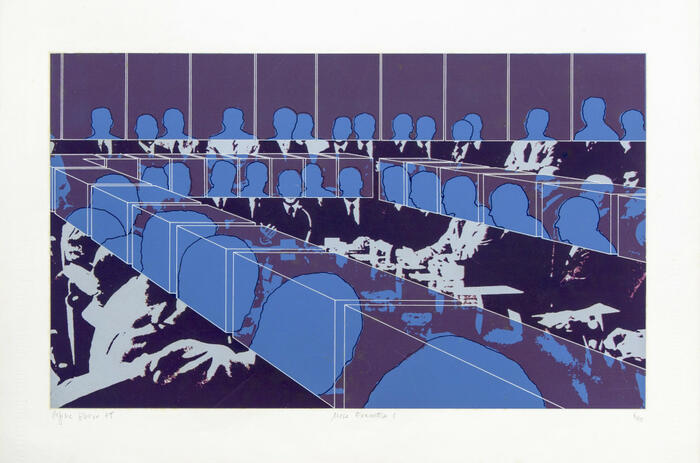
Barcelona's Center of Image La Virreina (La Virreina Centre de la Imatge) is dedicating an extensive exhibition to Regina Silveira (Porto Alegre, Brazil, 1939), one of the multimedia artists and key figures of Latin American conceptual art. Within the exhibition line of the center, which advocates the exploration of the aesthetic and ideological languages of images, this show curated by Isabella Lenzi covers a wide range of the Brazilian artist's research, experimentation and artistic production, particularly that developed with technical reproduction techniques and the circulation of images.
REGINA SILVEIRA'S DESTRUCTION OF POWER
Barcelona's Center of Image La Virreina (La Virreina Centre de la Imatge) is dedicating an extensive exhibition to Regina Silveira (Porto Alegre, Brazil, 1939), one of the multimedia artists and key figures of Latin American conceptual art. Within the exhibition line of the center, which advocates the exploration of the aesthetic and ideological languages of images, this show curated by Isabella Lenzi covers a wide range of the Brazilian artist's research, experimentation and artistic production, particularly that developed with technical reproduction techniques and the circulation of images.

Barcelona's Center of Image La Virreina (La Virreina Centre de la Imatge) is dedicating an extensive exhibition to Regina Silveira (Porto Alegre, Brazil, 1939), one of the multimedia artists and key figures of Latin American conceptual art. Within the exhibition line of the center, which advocates the exploration of the aesthetic and ideological languages of images, this show curated by Isabella Lenzi covers a wide range of the Brazilian artist's research, experimentation and artistic production, particularly that developed with technical reproduction techniques and the circulation of images.
REGINA SILVEIRA'S DESTRUCTION OF POWER
Barcelona's Center of Image La Virreina (La Virreina Centre de la Imatge) is dedicating an extensive exhibition to Regina Silveira (Porto Alegre, Brazil, 1939), one of the multimedia artists and key figures of Latin American conceptual art. Within the exhibition line of the center, which advocates the exploration of the aesthetic and ideological languages of images, this show curated by Isabella Lenzi covers a wide range of the Brazilian artist's research, experimentation and artistic production, particularly that developed with technical reproduction techniques and the circulation of images.
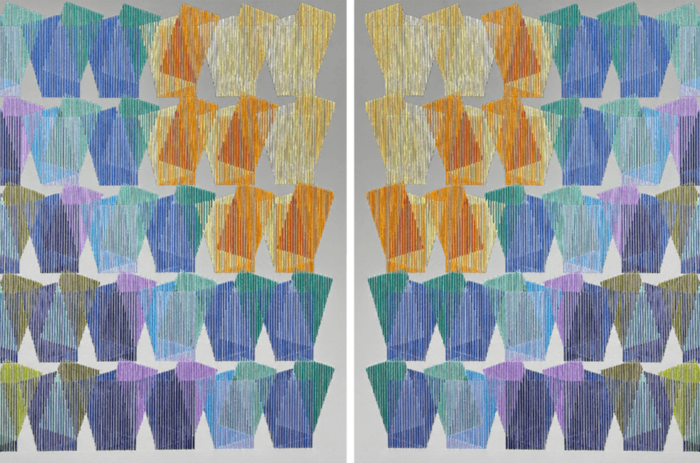
Isabella Despujols (Barquisemeto, Venezuela, 1994), Venezuelan artist based in Brazil, uses her artistic references for the realization of her latest series of works, a set made this year where textiles and embroidery are especially relevant, as well as the formal fact that they reflect. In them is palpable the conversation that he intends to maintain with those styles and languages that were fundamental in the countries to which he circumscribes his personal experience.
DESPUJOLS' EMBROIDERED GEOMETRY AT LLAMAZARES
Isabella Despujols (Barquisemeto, Venezuela, 1994), Venezuelan artist based in Brazil, uses her artistic references for the realization of her latest series of works, a set made this year where textiles and embroidery are especially relevant, as well as the formal fact that they reflect. In them is palpable the conversation that he intends to maintain with those styles and languages that were fundamental in the countries to which he circumscribes his personal experience.
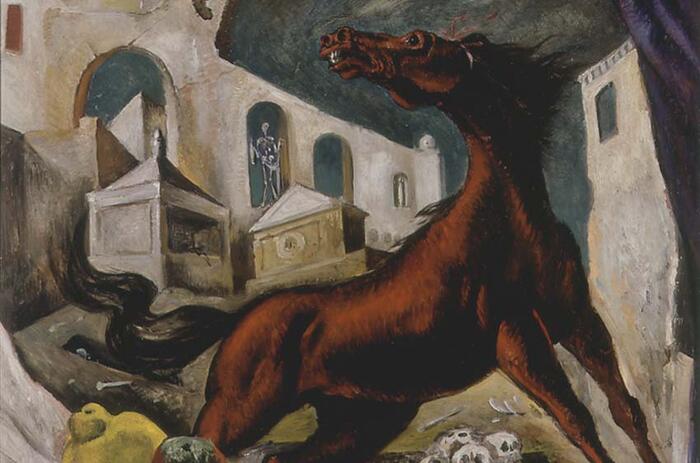
Fundación Casa de Mexico in Spain hosts the exhibition Modern Art of Mexico, with funds from the Blaisten Collection and curated by Daniel Garza Usabiaga, which takes an interesting look at the country's 20th century production through the eyes of Margarita Nelken (Madrid, Spain, 1894-Mexico City, Mexico, 1968).
MEXICAN MODERN ART ACCORDING TO NELKEN AND THE BLAISTEN COLLECTION
Fundación Casa de Mexico in Spain hosts the exhibition Modern Art of Mexico, with funds from the Blaisten Collection and curated by Daniel Garza Usabiaga, which takes an interesting look at the country's 20th century production through the eyes of Margarita Nelken (Madrid, Spain, 1894-Mexico City, Mexico, 1968).

Based on the biologicist theories on territoriality and the relationships derived from living beings with their immediate environment, the Angeles Baños gallery from Badajoz proposes an exhibition project to three Latin American artists so that, through their experiences and their personal vision, they can materialize and express those feelings of territoriality, and always from the parallelism of the human being with the rest of living beings.
THE TERRITORIAL BY THREE LATIN AMERICAN ARTISTS AT ÁNGELES BAÑOS
Based on the biologicist theories on territoriality and the relationships derived from living beings with their immediate environment, the Angeles Baños gallery from Badajoz proposes an exhibition project to three Latin American artists so that, through their experiences and their personal vision, they can materialize and express those feelings of territoriality, and always from the parallelism of the human being with the rest of living beings.
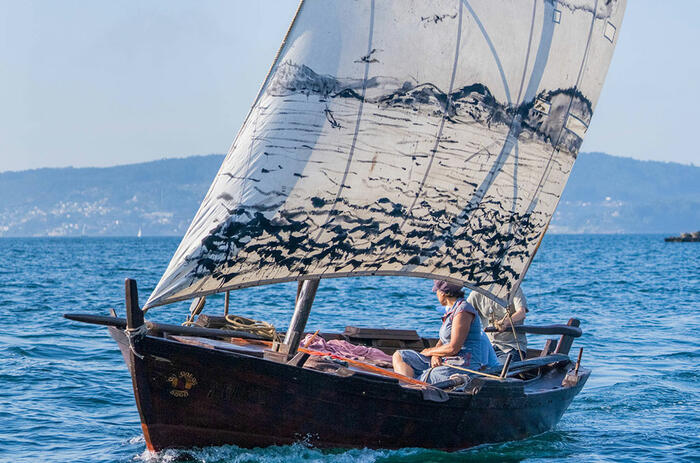
The Museum of Pontevedra exhibits Vento (wind, in Galician), the proposal that the artist Alberto Baraya (Bogota, Colombia, 1968) has developed and now shows at its headquarters in the Castelao Building as part of the cycle of exhibitions Infiltracións. This program aims to carry out specific projects that have as their backbone the dialogue arising from research and work with pieces from the collection of the Galician institution to promote re-readings on it.
VENTO BY ALBERTO BARAYA – IN PONTEVEDRA
The Museum of Pontevedra exhibits Vento (wind, in Galician), the proposal that the artist Alberto Baraya (Bogota, Colombia, 1968) has developed and now shows at its headquarters in the Castelao Building as part of the cycle of exhibitions Infiltracións. This program aims to carry out specific projects that have as their backbone the dialogue arising from research and work with pieces from the collection of the Galician institution to promote re-readings on it.
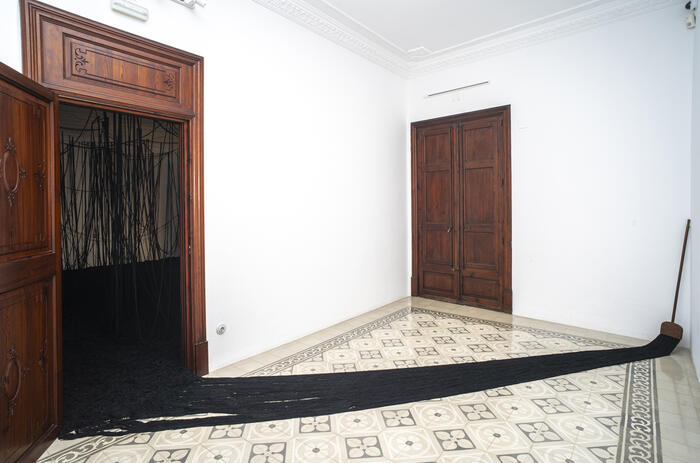
ALTTRA Foundation organizes in three spaces in Palma, on the island of Mallorca, an exhibition that addresses the theme of insularity and its role and idiosyncrasy in a globalized world through several works by Cildo Meireles (Rio de Janeiro, Brazil, 1948). The works chosen, corresponding to five different periods of the artistic production of one of the referents of Brazilian neo-conceptualism, trace a journey through some of the themes and investigations that the artist has developed throughout his life, from fortune and chance to the perception of the physically invisible but perceptible, such as sound, or the relationship between space and its use.
CILDO MEIRELES EN PALMA DE MALLORCA
ALTTRA Foundation organizes in three spaces in Palma, on the island of Mallorca, an exhibition that addresses the theme of insularity and its role and idiosyncrasy in a globalized world through several works by Cildo Meireles (Rio de Janeiro, Brazil, 1948). The works chosen, corresponding to five different periods of the artistic production of one of the referents of Brazilian neo-conceptualism, trace a journey through some of the themes and investigations that the artist has developed throughout his life, from fortune and chance to the perception of the physically invisible but perceptible, such as sound, or the relationship between space and its use.

Barcelona's Center of Image La Virreina (La Virreina Centre de la Imatge) is dedicating an extensive exhibition to Regina Silveira (Porto Alegre, Brazil, 1939), one of the multimedia artists and key figures of Latin American conceptual art. Within the exhibition line of the center, which advocates the exploration of the aesthetic and ideological languages of images, this show curated by Isabella Lenzi covers a wide range of the Brazilian artist's research, experimentation and artistic production, particularly that developed with technical reproduction techniques and the circulation of images.
REGINA SILVEIRA'S DESTRUCTION OF POWER
Barcelona's Center of Image La Virreina (La Virreina Centre de la Imatge) is dedicating an extensive exhibition to Regina Silveira (Porto Alegre, Brazil, 1939), one of the multimedia artists and key figures of Latin American conceptual art. Within the exhibition line of the center, which advocates the exploration of the aesthetic and ideological languages of images, this show curated by Isabella Lenzi covers a wide range of the Brazilian artist's research, experimentation and artistic production, particularly that developed with technical reproduction techniques and the circulation of images.

Isabella Despujols (Barquisemeto, Venezuela, 1994), Venezuelan artist based in Brazil, uses her artistic references for the realization of her latest series of works, a set made this year where textiles and embroidery are especially relevant, as well as the formal fact that they reflect. In them is palpable the conversation that he intends to maintain with those styles and languages that were fundamental in the countries to which he circumscribes his personal experience.
DESPUJOLS' EMBROIDERED GEOMETRY AT LLAMAZARES
Isabella Despujols (Barquisemeto, Venezuela, 1994), Venezuelan artist based in Brazil, uses her artistic references for the realization of her latest series of works, a set made this year where textiles and embroidery are especially relevant, as well as the formal fact that they reflect. In them is palpable the conversation that he intends to maintain with those styles and languages that were fundamental in the countries to which he circumscribes his personal experience.

Fundación Casa de Mexico in Spain hosts the exhibition Modern Art of Mexico, with funds from the Blaisten Collection and curated by Daniel Garza Usabiaga, which takes an interesting look at the country's 20th century production through the eyes of Margarita Nelken (Madrid, Spain, 1894-Mexico City, Mexico, 1968).
MEXICAN MODERN ART ACCORDING TO NELKEN AND THE BLAISTEN COLLECTION
Fundación Casa de Mexico in Spain hosts the exhibition Modern Art of Mexico, with funds from the Blaisten Collection and curated by Daniel Garza Usabiaga, which takes an interesting look at the country's 20th century production through the eyes of Margarita Nelken (Madrid, Spain, 1894-Mexico City, Mexico, 1968).

Based on the biologicist theories on territoriality and the relationships derived from living beings with their immediate environment, the Angeles Baños gallery from Badajoz proposes an exhibition project to three Latin American artists so that, through their experiences and their personal vision, they can materialize and express those feelings of territoriality, and always from the parallelism of the human being with the rest of living beings.
THE TERRITORIAL BY THREE LATIN AMERICAN ARTISTS AT ÁNGELES BAÑOS
Based on the biologicist theories on territoriality and the relationships derived from living beings with their immediate environment, the Angeles Baños gallery from Badajoz proposes an exhibition project to three Latin American artists so that, through their experiences and their personal vision, they can materialize and express those feelings of territoriality, and always from the parallelism of the human being with the rest of living beings.

The Museum of Pontevedra exhibits Vento (wind, in Galician), the proposal that the artist Alberto Baraya (Bogota, Colombia, 1968) has developed and now shows at its headquarters in the Castelao Building as part of the cycle of exhibitions Infiltracións. This program aims to carry out specific projects that have as their backbone the dialogue arising from research and work with pieces from the collection of the Galician institution to promote re-readings on it.
VENTO BY ALBERTO BARAYA – IN PONTEVEDRA
The Museum of Pontevedra exhibits Vento (wind, in Galician), the proposal that the artist Alberto Baraya (Bogota, Colombia, 1968) has developed and now shows at its headquarters in the Castelao Building as part of the cycle of exhibitions Infiltracións. This program aims to carry out specific projects that have as their backbone the dialogue arising from research and work with pieces from the collection of the Galician institution to promote re-readings on it.

ALTTRA Foundation organizes in three spaces in Palma, on the island of Mallorca, an exhibition that addresses the theme of insularity and its role and idiosyncrasy in a globalized world through several works by Cildo Meireles (Rio de Janeiro, Brazil, 1948). The works chosen, corresponding to five different periods of the artistic production of one of the referents of Brazilian neo-conceptualism, trace a journey through some of the themes and investigations that the artist has developed throughout his life, from fortune and chance to the perception of the physically invisible but perceptible, such as sound, or the relationship between space and its use.
CILDO MEIRELES EN PALMA DE MALLORCA
ALTTRA Foundation organizes in three spaces in Palma, on the island of Mallorca, an exhibition that addresses the theme of insularity and its role and idiosyncrasy in a globalized world through several works by Cildo Meireles (Rio de Janeiro, Brazil, 1948). The works chosen, corresponding to five different periods of the artistic production of one of the referents of Brazilian neo-conceptualism, trace a journey through some of the themes and investigations that the artist has developed throughout his life, from fortune and chance to the perception of the physically invisible but perceptible, such as sound, or the relationship between space and its use.

Barcelona's Center of Image La Virreina (La Virreina Centre de la Imatge) is dedicating an extensive exhibition to Regina Silveira (Porto Alegre, Brazil, 1939), one of the multimedia artists and key figures of Latin American conceptual art. Within the exhibition line of the center, which advocates the exploration of the aesthetic and ideological languages of images, this show curated by Isabella Lenzi covers a wide range of the Brazilian artist's research, experimentation and artistic production, particularly that developed with technical reproduction techniques and the circulation of images.
REGINA SILVEIRA'S DESTRUCTION OF POWER
Barcelona's Center of Image La Virreina (La Virreina Centre de la Imatge) is dedicating an extensive exhibition to Regina Silveira (Porto Alegre, Brazil, 1939), one of the multimedia artists and key figures of Latin American conceptual art. Within the exhibition line of the center, which advocates the exploration of the aesthetic and ideological languages of images, this show curated by Isabella Lenzi covers a wide range of the Brazilian artist's research, experimentation and artistic production, particularly that developed with technical reproduction techniques and the circulation of images.

Isabella Despujols (Barquisemeto, Venezuela, 1994), Venezuelan artist based in Brazil, uses her artistic references for the realization of her latest series of works, a set made this year where textiles and embroidery are especially relevant, as well as the formal fact that they reflect. In them is palpable the conversation that he intends to maintain with those styles and languages that were fundamental in the countries to which he circumscribes his personal experience.
DESPUJOLS' EMBROIDERED GEOMETRY AT LLAMAZARES
Isabella Despujols (Barquisemeto, Venezuela, 1994), Venezuelan artist based in Brazil, uses her artistic references for the realization of her latest series of works, a set made this year where textiles and embroidery are especially relevant, as well as the formal fact that they reflect. In them is palpable the conversation that he intends to maintain with those styles and languages that were fundamental in the countries to which he circumscribes his personal experience.

Fundación Casa de Mexico in Spain hosts the exhibition Modern Art of Mexico, with funds from the Blaisten Collection and curated by Daniel Garza Usabiaga, which takes an interesting look at the country's 20th century production through the eyes of Margarita Nelken (Madrid, Spain, 1894-Mexico City, Mexico, 1968).
MEXICAN MODERN ART ACCORDING TO NELKEN AND THE BLAISTEN COLLECTION
Fundación Casa de Mexico in Spain hosts the exhibition Modern Art of Mexico, with funds from the Blaisten Collection and curated by Daniel Garza Usabiaga, which takes an interesting look at the country's 20th century production through the eyes of Margarita Nelken (Madrid, Spain, 1894-Mexico City, Mexico, 1968).

Based on the biologicist theories on territoriality and the relationships derived from living beings with their immediate environment, the Angeles Baños gallery from Badajoz proposes an exhibition project to three Latin American artists so that, through their experiences and their personal vision, they can materialize and express those feelings of territoriality, and always from the parallelism of the human being with the rest of living beings.
THE TERRITORIAL BY THREE LATIN AMERICAN ARTISTS AT ÁNGELES BAÑOS
Based on the biologicist theories on territoriality and the relationships derived from living beings with their immediate environment, the Angeles Baños gallery from Badajoz proposes an exhibition project to three Latin American artists so that, through their experiences and their personal vision, they can materialize and express those feelings of territoriality, and always from the parallelism of the human being with the rest of living beings.

The Museum of Pontevedra exhibits Vento (wind, in Galician), the proposal that the artist Alberto Baraya (Bogota, Colombia, 1968) has developed and now shows at its headquarters in the Castelao Building as part of the cycle of exhibitions Infiltracións. This program aims to carry out specific projects that have as their backbone the dialogue arising from research and work with pieces from the collection of the Galician institution to promote re-readings on it.
VENTO BY ALBERTO BARAYA – IN PONTEVEDRA
The Museum of Pontevedra exhibits Vento (wind, in Galician), the proposal that the artist Alberto Baraya (Bogota, Colombia, 1968) has developed and now shows at its headquarters in the Castelao Building as part of the cycle of exhibitions Infiltracións. This program aims to carry out specific projects that have as their backbone the dialogue arising from research and work with pieces from the collection of the Galician institution to promote re-readings on it.

ALTTRA Foundation organizes in three spaces in Palma, on the island of Mallorca, an exhibition that addresses the theme of insularity and its role and idiosyncrasy in a globalized world through several works by Cildo Meireles (Rio de Janeiro, Brazil, 1948). The works chosen, corresponding to five different periods of the artistic production of one of the referents of Brazilian neo-conceptualism, trace a journey through some of the themes and investigations that the artist has developed throughout his life, from fortune and chance to the perception of the physically invisible but perceptible, such as sound, or the relationship between space and its use.
CILDO MEIRELES EN PALMA DE MALLORCA
ALTTRA Foundation organizes in three spaces in Palma, on the island of Mallorca, an exhibition that addresses the theme of insularity and its role and idiosyncrasy in a globalized world through several works by Cildo Meireles (Rio de Janeiro, Brazil, 1948). The works chosen, corresponding to five different periods of the artistic production of one of the referents of Brazilian neo-conceptualism, trace a journey through some of the themes and investigations that the artist has developed throughout his life, from fortune and chance to the perception of the physically invisible but perceptible, such as sound, or the relationship between space and its use.

Barcelona's Center of Image La Virreina (La Virreina Centre de la Imatge) is dedicating an extensive exhibition to Regina Silveira (Porto Alegre, Brazil, 1939), one of the multimedia artists and key figures of Latin American conceptual art. Within the exhibition line of the center, which advocates the exploration of the aesthetic and ideological languages of images, this show curated by Isabella Lenzi covers a wide range of the Brazilian artist's research, experimentation and artistic production, particularly that developed with technical reproduction techniques and the circulation of images.
REGINA SILVEIRA'S DESTRUCTION OF POWER
Barcelona's Center of Image La Virreina (La Virreina Centre de la Imatge) is dedicating an extensive exhibition to Regina Silveira (Porto Alegre, Brazil, 1939), one of the multimedia artists and key figures of Latin American conceptual art. Within the exhibition line of the center, which advocates the exploration of the aesthetic and ideological languages of images, this show curated by Isabella Lenzi covers a wide range of the Brazilian artist's research, experimentation and artistic production, particularly that developed with technical reproduction techniques and the circulation of images.

Isabella Despujols (Barquisemeto, Venezuela, 1994), Venezuelan artist based in Brazil, uses her artistic references for the realization of her latest series of works, a set made this year where textiles and embroidery are especially relevant, as well as the formal fact that they reflect. In them is palpable the conversation that he intends to maintain with those styles and languages that were fundamental in the countries to which he circumscribes his personal experience.
DESPUJOLS' EMBROIDERED GEOMETRY AT LLAMAZARES
Isabella Despujols (Barquisemeto, Venezuela, 1994), Venezuelan artist based in Brazil, uses her artistic references for the realization of her latest series of works, a set made this year where textiles and embroidery are especially relevant, as well as the formal fact that they reflect. In them is palpable the conversation that he intends to maintain with those styles and languages that were fundamental in the countries to which he circumscribes his personal experience.

Fundación Casa de Mexico in Spain hosts the exhibition Modern Art of Mexico, with funds from the Blaisten Collection and curated by Daniel Garza Usabiaga, which takes an interesting look at the country's 20th century production through the eyes of Margarita Nelken (Madrid, Spain, 1894-Mexico City, Mexico, 1968).
MEXICAN MODERN ART ACCORDING TO NELKEN AND THE BLAISTEN COLLECTION
Fundación Casa de Mexico in Spain hosts the exhibition Modern Art of Mexico, with funds from the Blaisten Collection and curated by Daniel Garza Usabiaga, which takes an interesting look at the country's 20th century production through the eyes of Margarita Nelken (Madrid, Spain, 1894-Mexico City, Mexico, 1968).

Based on the biologicist theories on territoriality and the relationships derived from living beings with their immediate environment, the Angeles Baños gallery from Badajoz proposes an exhibition project to three Latin American artists so that, through their experiences and their personal vision, they can materialize and express those feelings of territoriality, and always from the parallelism of the human being with the rest of living beings.
THE TERRITORIAL BY THREE LATIN AMERICAN ARTISTS AT ÁNGELES BAÑOS
Based on the biologicist theories on territoriality and the relationships derived from living beings with their immediate environment, the Angeles Baños gallery from Badajoz proposes an exhibition project to three Latin American artists so that, through their experiences and their personal vision, they can materialize and express those feelings of territoriality, and always from the parallelism of the human being with the rest of living beings.

The Museum of Pontevedra exhibits Vento (wind, in Galician), the proposal that the artist Alberto Baraya (Bogota, Colombia, 1968) has developed and now shows at its headquarters in the Castelao Building as part of the cycle of exhibitions Infiltracións. This program aims to carry out specific projects that have as their backbone the dialogue arising from research and work with pieces from the collection of the Galician institution to promote re-readings on it.
VENTO BY ALBERTO BARAYA – IN PONTEVEDRA
The Museum of Pontevedra exhibits Vento (wind, in Galician), the proposal that the artist Alberto Baraya (Bogota, Colombia, 1968) has developed and now shows at its headquarters in the Castelao Building as part of the cycle of exhibitions Infiltracións. This program aims to carry out specific projects that have as their backbone the dialogue arising from research and work with pieces from the collection of the Galician institution to promote re-readings on it.

ALTTRA Foundation organizes in three spaces in Palma, on the island of Mallorca, an exhibition that addresses the theme of insularity and its role and idiosyncrasy in a globalized world through several works by Cildo Meireles (Rio de Janeiro, Brazil, 1948). The works chosen, corresponding to five different periods of the artistic production of one of the referents of Brazilian neo-conceptualism, trace a journey through some of the themes and investigations that the artist has developed throughout his life, from fortune and chance to the perception of the physically invisible but perceptible, such as sound, or the relationship between space and its use.
CILDO MEIRELES EN PALMA DE MALLORCA
ALTTRA Foundation organizes in three spaces in Palma, on the island of Mallorca, an exhibition that addresses the theme of insularity and its role and idiosyncrasy in a globalized world through several works by Cildo Meireles (Rio de Janeiro, Brazil, 1948). The works chosen, corresponding to five different periods of the artistic production of one of the referents of Brazilian neo-conceptualism, trace a journey through some of the themes and investigations that the artist has developed throughout his life, from fortune and chance to the perception of the physically invisible but perceptible, such as sound, or the relationship between space and its use.

Barcelona's Center of Image La Virreina (La Virreina Centre de la Imatge) is dedicating an extensive exhibition to Regina Silveira (Porto Alegre, Brazil, 1939), one of the multimedia artists and key figures of Latin American conceptual art. Within the exhibition line of the center, which advocates the exploration of the aesthetic and ideological languages of images, this show curated by Isabella Lenzi covers a wide range of the Brazilian artist's research, experimentation and artistic production, particularly that developed with technical reproduction techniques and the circulation of images.
REGINA SILVEIRA'S DESTRUCTION OF POWER
Barcelona's Center of Image La Virreina (La Virreina Centre de la Imatge) is dedicating an extensive exhibition to Regina Silveira (Porto Alegre, Brazil, 1939), one of the multimedia artists and key figures of Latin American conceptual art. Within the exhibition line of the center, which advocates the exploration of the aesthetic and ideological languages of images, this show curated by Isabella Lenzi covers a wide range of the Brazilian artist's research, experimentation and artistic production, particularly that developed with technical reproduction techniques and the circulation of images.

Isabella Despujols (Barquisemeto, Venezuela, 1994), Venezuelan artist based in Brazil, uses her artistic references for the realization of her latest series of works, a set made this year where textiles and embroidery are especially relevant, as well as the formal fact that they reflect. In them is palpable the conversation that he intends to maintain with those styles and languages that were fundamental in the countries to which he circumscribes his personal experience.
DESPUJOLS' EMBROIDERED GEOMETRY AT LLAMAZARES
Isabella Despujols (Barquisemeto, Venezuela, 1994), Venezuelan artist based in Brazil, uses her artistic references for the realization of her latest series of works, a set made this year where textiles and embroidery are especially relevant, as well as the formal fact that they reflect. In them is palpable the conversation that he intends to maintain with those styles and languages that were fundamental in the countries to which he circumscribes his personal experience.

Fundación Casa de Mexico in Spain hosts the exhibition Modern Art of Mexico, with funds from the Blaisten Collection and curated by Daniel Garza Usabiaga, which takes an interesting look at the country's 20th century production through the eyes of Margarita Nelken (Madrid, Spain, 1894-Mexico City, Mexico, 1968).
MEXICAN MODERN ART ACCORDING TO NELKEN AND THE BLAISTEN COLLECTION
Fundación Casa de Mexico in Spain hosts the exhibition Modern Art of Mexico, with funds from the Blaisten Collection and curated by Daniel Garza Usabiaga, which takes an interesting look at the country's 20th century production through the eyes of Margarita Nelken (Madrid, Spain, 1894-Mexico City, Mexico, 1968).

Based on the biologicist theories on territoriality and the relationships derived from living beings with their immediate environment, the Angeles Baños gallery from Badajoz proposes an exhibition project to three Latin American artists so that, through their experiences and their personal vision, they can materialize and express those feelings of territoriality, and always from the parallelism of the human being with the rest of living beings.
THE TERRITORIAL BY THREE LATIN AMERICAN ARTISTS AT ÁNGELES BAÑOS
Based on the biologicist theories on territoriality and the relationships derived from living beings with their immediate environment, the Angeles Baños gallery from Badajoz proposes an exhibition project to three Latin American artists so that, through their experiences and their personal vision, they can materialize and express those feelings of territoriality, and always from the parallelism of the human being with the rest of living beings.

The Museum of Pontevedra exhibits Vento (wind, in Galician), the proposal that the artist Alberto Baraya (Bogota, Colombia, 1968) has developed and now shows at its headquarters in the Castelao Building as part of the cycle of exhibitions Infiltracións. This program aims to carry out specific projects that have as their backbone the dialogue arising from research and work with pieces from the collection of the Galician institution to promote re-readings on it.
VENTO BY ALBERTO BARAYA – IN PONTEVEDRA
The Museum of Pontevedra exhibits Vento (wind, in Galician), the proposal that the artist Alberto Baraya (Bogota, Colombia, 1968) has developed and now shows at its headquarters in the Castelao Building as part of the cycle of exhibitions Infiltracións. This program aims to carry out specific projects that have as their backbone the dialogue arising from research and work with pieces from the collection of the Galician institution to promote re-readings on it.

ALTTRA Foundation organizes in three spaces in Palma, on the island of Mallorca, an exhibition that addresses the theme of insularity and its role and idiosyncrasy in a globalized world through several works by Cildo Meireles (Rio de Janeiro, Brazil, 1948). The works chosen, corresponding to five different periods of the artistic production of one of the referents of Brazilian neo-conceptualism, trace a journey through some of the themes and investigations that the artist has developed throughout his life, from fortune and chance to the perception of the physically invisible but perceptible, such as sound, or the relationship between space and its use.
CILDO MEIRELES EN PALMA DE MALLORCA
ALTTRA Foundation organizes in three spaces in Palma, on the island of Mallorca, an exhibition that addresses the theme of insularity and its role and idiosyncrasy in a globalized world through several works by Cildo Meireles (Rio de Janeiro, Brazil, 1948). The works chosen, corresponding to five different periods of the artistic production of one of the referents of Brazilian neo-conceptualism, trace a journey through some of the themes and investigations that the artist has developed throughout his life, from fortune and chance to the perception of the physically invisible but perceptible, such as sound, or the relationship between space and its use.

